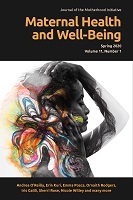Challenging the Invisibility of Queer Young Mothers
Abstract
The social identity category of “young mothers” refers to a diverse and marginalized group, which has been socially constructed by dominant political and faith-based regimes in Western society. For youth who identify as queer young mothers, multiple vectors of oppression result in the erasure of their identity and material needs, contributing to reduced access to appropriate healthcare which impacts the quality of their health and wellness and the health and wellness of their children. In this article, I argue that although the visibility of queer pregnant and parenting youth is an important step in order to collectively establish particular material needs, that recognition alone is not enough. Collaborative advocacy efforts must take an intersectional approach. I place two texts into conversation with one another: Gayle Rubin’s essay titled Thinking Sex and Rebecca Trotzky-Sirr’s retrospective memoirstyle essay, titled The Revolutionary Artist Mom and Baby League: Putting Young Queer Parents on the Map, which centres the voices of youth who identify as queer young mothers. By placing these two texts together, political factors relating to both sexuality and gender, as well as age and economic status, are made apparent, allowing one to trace how and why this group is rendered invisible by communities that serve young mothers and by communities that support queer parents. I then discuss how the combination of these two texts establishes a clear need to collaboratively advocate with queer pregnant and parenting youth to ensure that their particular material needs are met. I explore an intersectional approach to advocacy, and I suggest a sense of direction with respect to advocacy efforts for the needs of youth who identify as queer young mothers. In support of my argument, I draw from feminist theory, contemporary motherhood studies, and queer studies.Downloads
Published
How to Cite
Issue
Section
License
All intellectual property in relation to material included on this site belongs to the Motherhood Initiative for Research and Community Involvement (MIRCI). All material on this site is protected by Canadian and international copyright and other intellectual property laws. Users may not do anything which interferes with or breaches those laws or the intellectual property rights in the material. All materials on the Motherhood Initiative for Research and Community Involvement (MIRCI) are copyrighted and all rights are reserved. Any reproduction, modification, publication, transmission, transfer, sale, distribution, display or exploitation of the information, in any form or by any means, or its storage in a retrieval system, whether in whole or in part, without the express written permission of the Motherhood Initiative for Research and Community Involvement (MIRCI) is prohibited. Please contact us for permission to reproduce any of our materials. This site may include third party content which is subject to that third party's terms and conditions of use.


